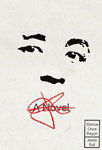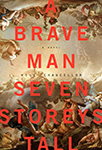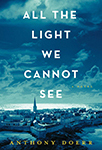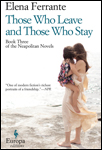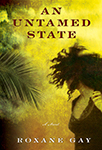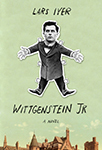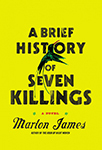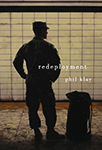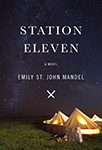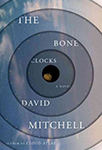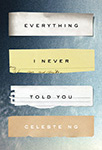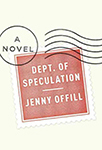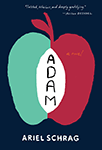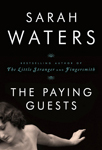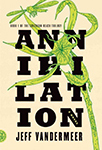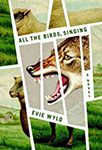by Jesse Ball
30% OFF at Powell’s »Nicole Cliffe: This was a demoralizing and personally humiliating experience, and I regret having agreed to participate.
First of all, I have a toddler and a newborn, and I’m not nearly as smart as I used to be, nor am I as judgmental. Therefore, my attitude toward people who have written books of any kind is now marked wholly by admiration. Imagine, writing a whole book! We should build castles for you and hold cups of mead to your lips.
My ability to pre-judge remains strong, however. When I was informed that my two books were Station Eleven and A Brief History of Seven Killings, I assumed my plan would be something like:
Set up battle of engrossing dystopian read that must ultimately be dwarfed by sprawling, Tolstoy-esque exploration of Jamaican history
+
briefly reference Canadian solidarity with my countrywoman Emily St. John Mandel
+
crown Marlon James the winner
+
avoid reading the comments because of the time when Natasha dissed John Green a few years ago and people went bananas, or when Edith and Kate Zambreno got into a fight
=
Cliffe’s still got it!
A good friend and trusted reader told me (and Facebook) a few months ago that she thought Station Eleven was overrated and that the dialogue was terrible and wooden. Which meant, of course, that when I started Station Eleven, I couldn’t just absorb the dialogue like a normal person, because I had been told it was terrible and wooden, which resulted in is this good dialogue? How do people talk? Do I talk like this? Should I read it aloud? Until, soon enough, all dialogue ceased to make any sense, like when you’ve looked at a word for too long and you’re not sure it’s even a word anymore.
What happened, though, is that Station Eleven turned out to be the fiction equivalent of the 121st episode of Star Trek: The Next Generation in which Kamala, played by the luminous Famke Janssen, is an empathic metamorph designed to adapt herself to become the perfect mate for an important diplomat. She winds up adapting to Picard, instead—it’s a great episode, you should watch it. And in this metaphor I am Picard, and Station Eleven is Kamala. It would be impossible for a book to be better suited for me. It is unfair that I have been placed in a position to evaluate its merits at all.
Station Eleven is beautiful and wistful and complex, and goes down like a Long Island Iced Tea. It involves a dead Toronto, which is the only thing better than a living Toronto. I would be surprised if the author were not influenced by Timothy Findley’s Headhunter, another great Canadian novel, and it’s also a little Robertson Davies-y (two of my favorite writers, imagine that). I read it in two sittings, I cried a little at the end, I mailed copies to my divorced parents. To me, Station Eleven, you are perfect.

It even ends well, which dystopian novels tend to struggle with. I mean, it does the same thing most dystopian novels do, which is to create some equivalent of a single blade of grass poking up out of the concrete, life will find a way, etc. But it seemed, here, lovely and organic and still sad—and look, I thought it was great. You should buy it. It’s the winner. I could just keep saying nice things about it, but that’s a waste of your time.
A Brief History of Seven Killings is very good. I did not really understand what was happening. I had to constantly flip back to the list of characters provided at the beginning. I had to consult Wikipedia. I read it twice. Being able to do so is courtesy of a weird brain glitch I’ve enjoyed my entire life, in which I do not see word/word/word, I see three-line-chunk/three-line-chunk/three-line-chunk and it goes schloop into my brain as a unit. It’s obviously nice to be able to read very quickly, as a result, but it’s especially nice for lyrical/experimental novels like A Brief History. After the first read, when I still thought I might be able to force it into some kind of artificial coherence, I realized it would be better to just joyously surf it the second time around and float in the words and not get hung up on how difficult it was to distinguish between some of the many, many protagonists, some of whom are dead. That’s definitely my recommendation for how to read it. Though it may make more sense to you to read it conventionally if you are not suffering from baby-mush-brain!
At first glance, there would seem to be no connection between Station Eleven and A Brief History, but I did find myself thinking that a reasonable criticism of the former is that the author manages to avoid writing about the more Mad Max Beyond Thunderdome phase of her post-plague landscape by having everyone just be all “Year One was pretty bad! Oh, man, let’s not even talk about Year One! Shit happened on the road, I’ve blocked it all out, but it was pretty heavy, let me tell you,” and A Brief History does not even remotely flinch from the visceral horror of the physical and sexual violence it depicts. It is awash in looking at the broken body.
When I say that you can work your way through A Brief History by just surfing the language, I mean it. I loved Station Eleven, but there was no part of Station Eleven that I feel a strong need to quote here. With A Brief History, I dog-eared entire pages of glorious text. As an ironic misandrist, I would like to particularly credit James for writing Nina Burgess so well. I have rarely seen a male author do a better job, honestly. There’s a realness and a sexiness and a vibrancy to Nina, and her chapters frequently had moments that knocked me on my ass:
I need to go home. But I’m outside here, waiting on him. You ever feel like home is the one place you can’t go back to? It’s like you promise yourself when you got out of bed and combed your hair that this evening, when I get back I’ll be a different woman in a new place. And now you can’t go back because the house expects something from you.
I had not really expected that a book that says “pussyhole” roughly every four sentences would be better at explaining why you can’t go home again than Thomas Wolfe, but there you have it.
Why is this book not better than Station Eleven? It was 36 percent too complicated. There were 16 too many people. It was 48 percent too confusing. Station Eleven pleased me 100 percent.
Elliott: I was so happy when I found out that Station Eleven was a Zombie. It’s so beautifully constructed and reading it is such an absorbing, magical experience. And I love the wistful tone. It’s a book I’ve felt comfortable recommending to a lot of people, because it appeals to so many different readers. Its widespread appeal is part of its charm: It’s tapping into some universal themes and fears. And now, reading Judge Cliffe’s verdict, I feel like singing “O Canada.”
Laura: I’m with you all the way on being thrilled to see Station Eleven return as a Zombie. I was sad to see it go so soon. Too soon! It’s a wonderful, engrossing novel, and one that absolutely deserves to be in the mix.
However.
I have mixed feelings about Judge Cliffe’s ruling. It’s such a hard call, since these are very different books with very different aims, and the challenge of that comes across in the judgment. I loved Station Eleven and so deeply admired the graceful intricacy of the world (reading it is a magical experience), but on the other hand I was positively floored, and remain very haunted, by A Brief History of Seven Killings. It’s a challenging and unrelenting novel. As Judge Cliffe says, it’s “36 percent too complicated.” To me, I guess, that’s not a bad thing. The scope is epic.
Elliott: It makes me think of the famous Matisse quote comparing art to an armchair: “What I dream of is an art of balance, of purity and serenity devoid of troubling or depressing subject matter … a soothing, calming influence on the mind, rather like a good armchair which provides relaxation from physical fatigue.” I love Matisse’s paintings and cut-outs, but I’d be really sad if all art and literature were “devoid of troubling or depressing subject matter.” It depresses me to think about a world in which only comforting books are published. I love books that don’t aim to please. I love books that innovate with language and form. I love challenging books, like A Brief History, in which language is the engine. A Brief History is a daring, haunting, and often very funny book, and reading it was a thrill. A discomforting thrill, but a thrill nonetheless. A “blood in the mouth” thrill, to use the excellent phrase you mentioned in one of our earlier match commentaries.
Laura: I got that phrase from the great Stacey D’Erasmo (author of Wonderland and The Sky Below, among other novels), if memory serves. She was asking for more “blood in the mouth” from one of my stories, and that phrase has stayed with me ever since.
Elliott: That sounds like something Stacey would say! She’s brilliant.
Laura: These judgments all go back to how personal reading is, how it can be hard to predict what will strike us the most powerfully. These are both kickass books and so really I’m just cranky that A Brief History is out of the tournament, since I was ready to bet cold hard cash on it going all the way. Then again, every time I’ve gambled I’ve lost all my money, so—
Elliott: I’m still cranky that Jenny Offill is out of the tournament. But I really thought Marlon James would make it to the championship, not only because judges in previous rounds raved about his novel, but because in the past, some big, ambitious books (Cloud Atlas, The Orphan Master’s Son, Wolf Hall) have been rewarded by the ToB.
I thought we might end up with a final like the one two years ago, when we had a big, challenging book (The Orphan Master’s Son) competing against a beloved, bestselling one (The Fault in Our Stars). I think A Brief History of Seven Killings is genius, but it would be no fun if every reader agreed. I’m just glad Judge Cliffe recognized the wonders of James’s prose. Someday I’d love to teach a class in which we read Faulkner’s As I Lay Dying and James’s A Brief History back to back. A Brief History may no longer be in contention for the Rooster, but I’m willing to bet that people will still be reading it decades from now.
And speaking of decades, this is the 11th annual Tournament of Books (the first was in 2005). Four ToB winners have gone on to win the Pulitzer Prize for fiction: The Road, The Brief Wondrous Life of Oscar Wao, A Visit From the Goon Squad, and The Orphan Master’s Son. (Last year’s Pulitzer winner, The Goldfinch, was on the ToB shortlist, but didn’t win the Rooster.) Our 2015 tournament championship will be Station Eleven versus whichever book wins the second Zombie match on Monday. Which makes me wonder: Will this year’s Rooster winner also win the Pulitzer?
Only American writers are eligible for the Pulitzer, so that rules out Marlon James, who is Jamaican (unless he has become an American citizen?). Emily St. John Mandel is from Canada, but I think she might now have American citizenship. I’m sure the great Anthony Doerr is in the running for All the Light We Cannot See. I hope Jenny Offill is in the running for Dept. of Speculation. And I think that a few excellent books that weren’t in this year’s ToB are serious contenders: Family Life by Akhil Sharma, Euphoria by Lily King, and Lila by Marilynne Robinson, which just won the National Book Critics Circle award for fiction. Preparation for the Next Life by Atticus Lish, which is a finalist (along with Station Eleven and Dept. of Speculation) for the PEN/Faulkner Award, could be a surprise contestant. What do you think?
Laura: The Rooster certainly has quite the track record with the Pulitzer, which often anoints books that are both critically acclaimed and have achieved a wide readership. All the Light We Cannot See seems like a natural contender, and perhaps Station Eleven as well. I’d say Lila for sure, but is it possible to win two Pulitzers? Every now and then the Pulitzer goes for a wildcard (e.g., Tinkers), and though I’ve not yet read Preparation for the Next Life, it seems like a good candidate for a surprise win. Could Redeployment be in the mix? I can’t help but pull for story collections in these matters.
Elliott: Redeployment is great, but it won the National Book Award, so I’d be surprised if it also wins the Pulitzer. I correctly predicted that both A Visit From the Goon Squad and The Orphan Master’s Son would win the Pulitzer, and I was thrilled that those books won, but I never dreamed that The Goldfinch would take it. So I don’t pretend to be any kind of guru when it comes to this stuff. But I’ll go out on a limb and predict that Akhil Sharma is going to win the Pulitzer for Family Life.
But it all depends on the taste of the judges—and I have no idea who the Pulitzer’s judges are this year. If only every literary prize were as transparent as the Tournament of Books! I love that judges in this contest have to explain their verdicts.
Laura: Me too! Even if you disagree, it’s always interesting to hear the judges make a case for their selection, especially since in the tournament each judgment hinges on just one person’s opinion (save for the championship, which comes to a vote), as opposed to decision by committee, where it can be harder to know if all voices got equal weight. As for The Goldfinch, well, suffice it to say that I would have been very interested to read that judgment. I admire Donna Tartt and adored The Secret History, but found that pick for the Pulitzer a bit confounding.
Elliott: If it had been up to me, Rachel Kushner would have won for The Flamethrowers.
Laura: Yep, I was #TeamKushner all the way too. But hey, as long as they choose a book. I’m still mad about that year when they declined to name a fiction winner.
Elliott: Anyway, the Pulitzers will be announced in April, so we’ll find out soon. But first we need to find out who wins the Rooster! There have been so many surprises this year that anything could happen.
Laura: On Monday, we’ll find out who wins the other Zombie match between All the Light We Cannot See and An Untamed State, judged by Stephin Merritt of The Magnetic Fields.


